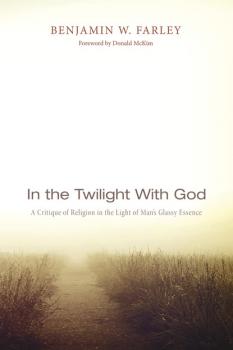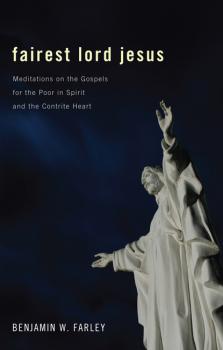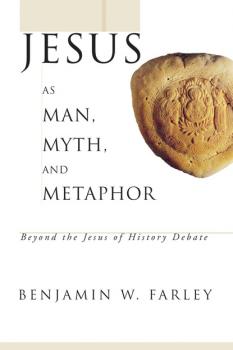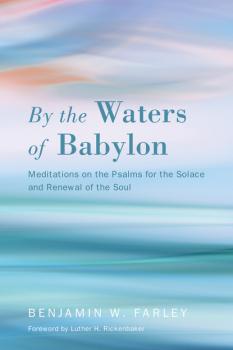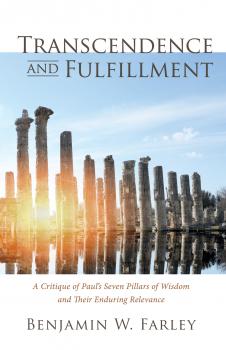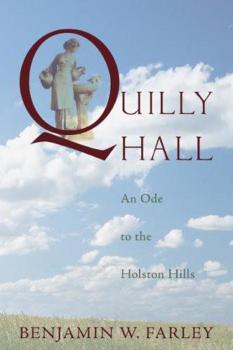ТОП просматриваемых книг сайта:
Benjamin W. Farley
Список книг автора Benjamin W. FarleyАннотация
Granted that God may exist, how may God be defined in our time? Addressing this issue Benjamin Farley explores a variety of belief systems, Western and Eastern, religious and skeptical.
Taking an approach that is both critical of religion as well as sympathetic, Farley refuses to shy away from hard questions or to dismiss constructive answers that speak to the human condition. He distinguishes human «intellectual ascent» towards God from humankind's «innate and inner sense» to know and relate to the living God, demonstrating the efforts and rewards of both approaches in Christianity, as well as in Hinduism, Buddhism, Taoism, and Zen. Alongside these more obviously «religious» approaches, Farley reviews the methodologies and findings of today's greatest scientific minds, including skeptics such as Hawking, Dawkins, and Wilson, as well as their skeptical forerunners of the past. He argues that belief in God can no more ignore the scientific truth about the universe than science can dismiss the spiritual yearnings and hunger of humanity for purpose, meaning, and its inescapable sense of the presence of God.
Taking an approach that is both critical of religion as well as sympathetic, Farley refuses to shy away from hard questions or to dismiss constructive answers that speak to the human condition. He distinguishes human «intellectual ascent» towards God from humankind's «innate and inner sense» to know and relate to the living God, demonstrating the efforts and rewards of both approaches in Christianity, as well as in Hinduism, Buddhism, Taoism, and Zen. Alongside these more obviously «religious» approaches, Farley reviews the methodologies and findings of today's greatest scientific minds, including skeptics such as Hawking, Dawkins, and Wilson, as well as their skeptical forerunners of the past. He argues that belief in God can no more ignore the scientific truth about the universe than science can dismiss the spiritual yearnings and hunger of humanity for purpose, meaning, and its inescapable sense of the presence of God.
Аннотация
The Gospels portray Jesus as one who often sought solitude, whether for himself or in quietude before his Father. To do so he had to withdraw from both his disciples and others. Such moments enabled him to renew his inner strength, to find God's consolation for himself, as well as to imbue him with insight and courage for the inimitable journey that God had selected him to travel.
We too need those same personal moments with God, those quiet occasions for withdrawal and reflection. If you have ever hungered for such, Fairest Lord Jesus, filled with simple, direct, and uncomplicated meditations, will speak to you. Within its pages, you will journey with Jesus across the Gospels to his Cross, hear his voice of solace and commission, while resting with him in village after village as he pauses to mend the hearts of the contrite and the lonely and heal the broken, dispirited, and ill; and, finally, on that Morning of mornings, stand with him in that Sacred Garden of the soul, where he fills all hearts with the joy of his presence and his eternal love.
In addition, enriching the collection are numerous vignettes, drawn from Farley's years of teaching philosophy and religion courses, along with poignant stories of the passage of time.
We too need those same personal moments with God, those quiet occasions for withdrawal and reflection. If you have ever hungered for such, Fairest Lord Jesus, filled with simple, direct, and uncomplicated meditations, will speak to you. Within its pages, you will journey with Jesus across the Gospels to his Cross, hear his voice of solace and commission, while resting with him in village after village as he pauses to mend the hearts of the contrite and the lonely and heal the broken, dispirited, and ill; and, finally, on that Morning of mornings, stand with him in that Sacred Garden of the soul, where he fills all hearts with the joy of his presence and his eternal love.
In addition, enriching the collection are numerous vignettes, drawn from Farley's years of teaching philosophy and religion courses, along with poignant stories of the passage of time.
Аннотация
Current New Testament scholarship has done much to advance knowledge of Jesus's authentic words and message. The works of Crossan, Borg, Vermes, Mack, and many others attest to this movement. In this process, however, the Christ of the Gospels, or the so-called Christ of faith, has been caught in the crosshairs, forcing Christianity to reflect anew on the church's interpretation of his life and place in history. Has the church's dogma overreached the «facts» of Jesus's life?
Farley's book addresses these issues and offers a feasible and illuminating context within which to reexamine Jesus's life and significance for modern humankind. His book probes the boundaries of Jesus as a historical person (as a man), as a figure of mythical proportions, and as a metaphor for today's Christian sense of wholeness. Along the way, Farley incorporates the insights of Carl Jung, Joseph Campbell, and Paul Tillich to demonstrate the ways that psychology, mythology, and symbolism contribute to an appreciation of Jesus that moves beyond the debate of Jesus's historical status alone.
Farley's book addresses these issues and offers a feasible and illuminating context within which to reexamine Jesus's life and significance for modern humankind. His book probes the boundaries of Jesus as a historical person (as a man), as a figure of mythical proportions, and as a metaphor for today's Christian sense of wholeness. Along the way, Farley incorporates the insights of Carl Jung, Joseph Campbell, and Paul Tillich to demonstrate the ways that psychology, mythology, and symbolism contribute to an appreciation of Jesus that moves beyond the debate of Jesus's historical status alone.
Аннотация
The Psalms have long been the preferred prayer book of souls in quest of God's guidance and comfort. It has been a hymnbook for the soul and a trove for canticles and verses of the heart. The Psalms have served both Judaism and Christianity's religious communities as a favored source of rich and magnificent readings perfect for liturgical settings. Most significantly, they have nurtured the soul in its desperate times of brokenness and longing for God. This is true of both religions and of their various branches across the years. For that reason, the Psalter ranks among the noblest of spiritual masterpieces, cherished for its eloquent and poignant prayers that lift the heart to God even as they bring God down to mend the soul. We need such times of private and communal withdrawal into the sphere where God alone reins. Solitariness with God heals the heart's wounds, individually and communally. Alone with God, God sees us as we are and allows us to acknowledge ourselves as we are–at our best and worst, in our joy and folly. The Psalms remind us that God is inescapably present wherever we allow God in to renew, inspire, redeem, and fulfill the highest hopes of our human capacity. By the Waters of Babylon provides meditations on all 150 of the Psalter's hymns. They are written to speak to the heart as well as to the mind and soul in search of grace and consolation.
Аннотация
Little could Darby Peterson have anticipated the intensity of the challenge his friend Garnett Nelson's invitation would command. Due to a medical condition that requires Nelson's urgent attention, Nelson urges his long-time friend, Darby, to serve as the host and counselor of his Villa during his absence. The Villa, known as Montesereno, is committed to providing rest and renewal for its many clients and guests, suffering from a variety of contemporary disorders. Many who come are obsessed with bipolar anomalies, alcohol and anger issues, along with depression and sexual addictions. Darby recognizes the invitation requires counseling skills that he frankly lacks, as his field is philosophy; nonetheless, he accepts, inasmuch as Garnett has always wanted him to join his staff because of his «friendly and open-minded» nature and background as a «Renaissance man» and «conversationalist.» Thus Darby takes a leave of absence from his position as chair of his Atlanta University's department of philosophy for however long Garnett should need him. What Darby cannot know is that his new role will become permanent. Adding to the mystique of his decision, if not contributing to its ultimate success, is the discovery of the Villa's clients of Darby's background as an ex-priest, tormented by his own past, divorce, and quest for love and healing. That the Villa is located in the scenic mountains of North Carolina, along its panoramic Parkway, adds to the wholeness and solace that Nature makes possible. There is ample love and challenge, as well as magic and mending in this story for every reader.
Аннотация
Farley's Transcendence and Fulfillment captures one's immediate attention, especially with his designation of Paul's «Seven Pillars of Wisdom.» Readers will find his selection intriguing and illuminating. While being faithful to Paul's self-understanding and theological views, Farley offers a constructive and critical examination of the pillars' relevance for Paul's time as well as our own. The author blends biblical insight with a range of classical and contemporary philosophical opinion. In doing so, he draws on Plato and Cicero's wisdom, in addition to the critical works of Kierkegaard, Heidegger, Marcel, and Berdyaev. Students and professors of Paul's life and theology, along with clergy and lay admirers of Paul's views, will find Farley's book a useful resource for a provocative yet spiritually rich journey, true to Paul's teachings and of enduring relevance.
Аннотация
Quilly Hall weds fiction and history in this powerful story, set in the 1940s in the Holston Valley near the town of Abingdon, Virginia. Daniel Boone twice camped here. The town itself served as a rail hub during the Civil War and cared for the wounded in its hospitals. The novel's title refers to a statuette whose presence in the old home's hallway haunts the story. Farley's novel traces the life of Thomas Edmonds, an only son whose father was killed in the battle for Guadalcanal, and who is raised by a bevy of family who regale him with their proud past. One of his ancestors–a veteran of the Battle of Chickamauga–is alleged to have buried a treasure under a rock in the fabled Knobs above the home place. Foray after foray is mounted in search of this rock and its secret. A favorite uncle and scruffy farmhands become Tom's mentors until he matures, attends Harvard, marries, and leaves for Vietnam.
Farley's style and his story are gripping, compelling, and melodic. You will fall in love with each character and grieve as one by one they pass on.
Farley's style and his story are gripping, compelling, and melodic. You will fall in love with each character and grieve as one by one they pass on.
Аннотация
It is 1970, the year of Marc Chagall's famous art exhibit in Paris. Clayton Rogers Clarke, a Virginian, has chosen the city as his place of residence while pursuing research during his first sabbatical. His philosophical interests, however, suffer sudden distraction from an unanticipated competitor: Monique Gibert, a writer for a French daily, for whom her husband (Jacques-Maria) is the senior journalist. Flirtatious quips and nods soon lead to a passionate affair. While dividing his time between Monique and his studies, he meets a fellow PhD, also on sabbatical. Professor Carl Sullivan's field is the Classics, and it is his conviction that humankind has scarcely progressed beyond Homer. Clayton is determined to prove him wrong. Scores of delightful characters in Clarke's pension add intrigue and verve to the story. Wander with Clayton and Monique as they make their way into each other's hearts, while traversing the city's cafes and parks that Paris alone affords lovers. And ponder with the young philosopher the age-old question of the human condition. Students of the Classics, of the Humanities and French literature, as well as philosophy, will find the author's synopses of Rousseau and Pascal, and of Homer's gods and heroes, of immense help, along with his translations of Goethe, Rilke, and Baudelaire's poems.

